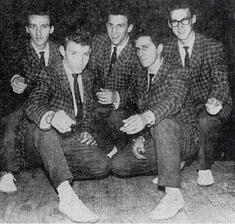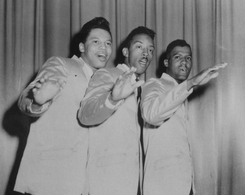-
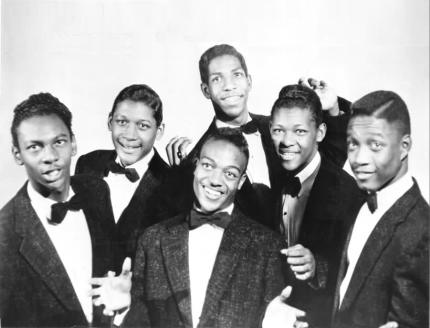
The El Dorados (1) (Chicago)
Personnel :
Pirkie Lee Moses(Lead)
Arthur Basset(Tenor)
Jewell Jones(Tenor)
Louis Bradley(Tenor)
James Maddox(Baritone)
Richard Nichens(Bass)
Discography :
The El Dorados (1)
1954 - Baby I need you / My loving baby(VeeJay 115)
1954 - Annie's answer / Living with Vivian(VeeJay 118 )
1954 - One more chance / Little miss love(VeeJay 127)
1955 - At my front door / What's buggin' you baby(VeeJay 147)
1955 - I'll be forever loving you / I began to realize(VeeJay 165)
1955 - Now that you've gone / Rock'n' roll's for me(VeeJay 180)
1956 - A fallen tear / Chop ling soon(VeeJay 197)
1956 - Bim bam boom / There in the night(VeeJay 211)
1957 - Tears on my pillow / A rose for my darling(VeeJay 250)
1957 - Three reasons why / Boom diddle boom(VeeJay 263)
1958 - Lights are row / Oh what a girl(VeeJay 302)
1970 - In over my head / You make my heart sing (Torrid 100)
1981 - She don't run around (Charly LP 1022)
1981 - Trouble trouble (Charly LP 1022)
1984 - Love my own (Solid Smoke LP 8025)
N/A - She Don’t Run Around
N/A - It’s No Wonder
N/A - Love Of My Own
N/A - Make Me A Sweetie
N/A - Trouble, Trouble
N/A - Language Of Love
N/A - Always My Love
N/A - Why Must I
N/A - Lord Knows I Tried
The El Dorados (1) with Hazel McCollum
1954 - Annie's answer / living with vivian (Vee Jay 118)
The Four El Dorados
1958 - A Lonely boy / Go! Little Susie (Academy 8138)
Biography :
One of the leading R&B vocal groups on Vee Jay, the El Dorados had a relatively short career with their first lineup, during which they scored a massive crossover hit, 1955's "At My Front Door" (number 17 on the pop charts and number one R&B, where it remained for 18 weeks). They managed only one other charting record -- 1956's "I'll Be Forever Loving You" -- before their initial breakup in 1959. Subsequent lineups and name changes (and alterations) brought no further success, but they continued performing well into the '80s.
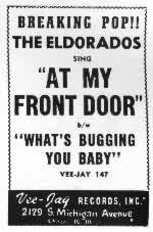
The original group featured five members -- Pirkle Lee Moses Jr. (lead), Louis Bradley (tenor), Jewel Jones (second tenor and baritone), James Maddox (baritone and bass), and Robert Glasper (bass) -- when they formed in the Englewood section of Chicago's south side in 1952 while still attending Englewood High School (the same school that the Moroccos attended). They were calling themselves the Five Stars. Johnny Moore, their high school custodian, liked the group so much and thought they showed so much promise, that he became their manager.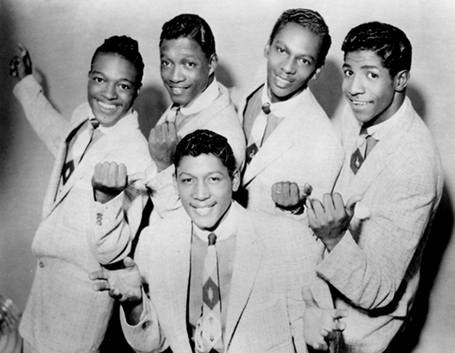
In 1954, just after graduation, Moses and Glasper took advantage of the Air Force's 90-day active duty program, but while Moses returned, Glasper remained with the Air Force. By then, Arthur Bassett (tenor) had temporarily replaced Moses, and Richard Nickens came in for Glasper. The Five Stars were now six, and a name change was inevitable. They were about to become the Cardinals (apparently, they had no knowledge of Atlantic's New York-based group) when the craze for naming your group after a popular car model hit, and since they couldn't call themselves the Cadillacs, the settled for Cadillacs' luxurious two-door model, the El Dorado, for inspiration. The El Dorados came to the attention of local Chicago WWCA disc jockey Al Benson, who witnessed first-hand how their gorgeous blend of harmonies and talent made for an exciting new group that he could support. They had already won first prize at a local talent show at the Club De Lisa. Benson arranged for the group to audition at a contest hosted by Vee Jay Records at the Park City Skating Rink. Amateur groups were challenged to compete against Vee Jay's Spaniels. The El Dorados rose to the challenge, winning the contest and a recording contract with the label.
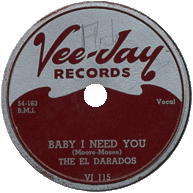
The El Dorados' first single, a bluesy ballad called "My Loving Baby," was issued in September 1954, and was a popular regional seller. Their next effort had the group backing up Hazel McCollum on "Annie's Answer," which was Vee Jay's contribution to the ongoing "Annie" saga begun by Hank Ballard and the Midnighters. Perhaps tiring of all the Annie nonsense, Arthur Bassett ankled the El Dorados (he also joined the Air Force), and the sextet slimmed down to a quintet. During the third week of September 1955, Vee Jay released the group's "At My Front Door," which stormed the Billboard R&B charts on September 24th and the Top 100 on October 15th. The song featured Al Duricati's pounding drum rhythm and a rousing sax solo. The so-called "baby talk" pre-finale by Moses Jr. made the record soar even further, and the lyrics about that "crazy little mama" became as legendary as the Annie saga. By the end of the year it had climbed to number 17 on the pop charts and number one R&B, where it remained for 18 weeks. (Pat Boone later did a cover version that charted at number seven pop).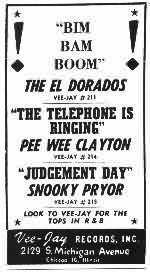
Their follow-up, "I'll Be Forever Lovin' You" (originally recorded by the Rip Chords but never released), was issued during the second week of December. It was a rocker that exuded jazz, pop, and R&B overtones, but although it made it to number eight R&B in February 1956, it never charted on the pop lists. Soon after the release of the follow-up, Nickens left and the El Dorados soldiered on as a quartet. A few additional singles performed well in certain U.S. cities, but didn't measure up to their prior hit status. Their next single, "Tears on My Pillow" (a different song from Little Anthony and the Imperials' hit record), was the last by all of the original El Dorados; soon after its release, the group and Pirkle Moses Jr. separated over a disagreement on new management.

Moses Jr. soon joined another Vee Jay act, the Kool Gents, who had been left without a singer when their frontman, Dee Clark, departed for a solo career. John McCall (tenor), Douglas Brown (second tenor), Teddy Long (second tenor and baritone), and Johnny Carter (bass) of the Kool Gents joined with Moses Jr., to become the New El Dorados. They released two singles in 1958 for Vee Jay, but when neither sold, they eventually left Vee Jay in a money dispute and subsequently disbanded altogether.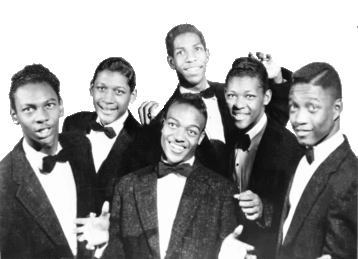
During this same time, the remaining El Dorados -- Jones, Bradley, and Maddox -- joined up with new lead singer Marvin Smith. Smith had moved with his family to the west side of Chicago in the late '40s, where he attended Crane High and sang on street corners and in church choirs, before joining the group as their new lead vocalist. To avoid legal problems with Vee Jay, the group's name was changed to Those Four El Dorados for 1958's "A Lonely Boy," Academy Records of Chicago. Jewel Jones' name on the label was spelled J-u-e-l-l (each member's name was listed). Those Four El Dorados' later traveled to the West Coast, and connected with a former NBA basketball star Don Barksdale, who had formed his Rhythm Record Company in Oakland, CA. The group changed monikers again, this time calling themselves the Tempos, but the group faltered again, and returned to Chicago, splitting up in 1961.
Bryan Thomas
http://www.destinationdoowop.com/eldorados.htm
http://home.earthlink.net/~jaymar41/eldos.html
http://home.att.net/~marvart/Eldorados/eldorados.html
CD :MP3 :
 your comment
your comment
-

Bobby Russell & Buzz Cason
The Todds (Nashville, T.N.)
aka The Countdowns (1) aka The F. J. BabiesPersonnel :
Buzz Cason
Bobby Russell
Tony Moon
Discography :
The Todds
1961 - Tennessee / May We Always (Todd 1064)
1962 - Popsicle / Sugar Hill (Todd 1076)The Countdowns (1)
1961 - Watermelon / The Writing On The Wall (Image 5002)The F. J. Babies
1962 - She Has / And The Moon Came Down (Apt 25068)Biography :
By 1957, The Casuals had become a touring act, replacing The Everly Brothers on a tour of 60 fair dates. Later, legendary manager, Dub Albritton heard the group and The Casuals became Brenda Lee's backing band. The original Casuals were Buzz Cason, Richard Williams, Billy Smith, Chester Power and Johnny McCreery. During this same period, Buzz Cason met Bobby Russell, an aspiring writer at the old Globe Recording Studio in Nashville located above Mom's Tavern (now Tootsie's Orchid Lounge) and the two began to co-write. Gary Paxton became a publisher for Lowery Music of Atlanta and published their "ba- ba-ba" Jan and Dean-type song, "Tennessee." They made another Todds single on the tune "Popsicle," which, like "Tennessee," was later covered by Jan and Dean on Liberty. The Todds' session was produced by their new production company, Tri-Arts, which Bobby Russel and Buzz Cason formed with Tony Moon (From Dante & The Evergreens). They opened an office together on 16th Avenue, but soon realized they had no viable way to pay rent.
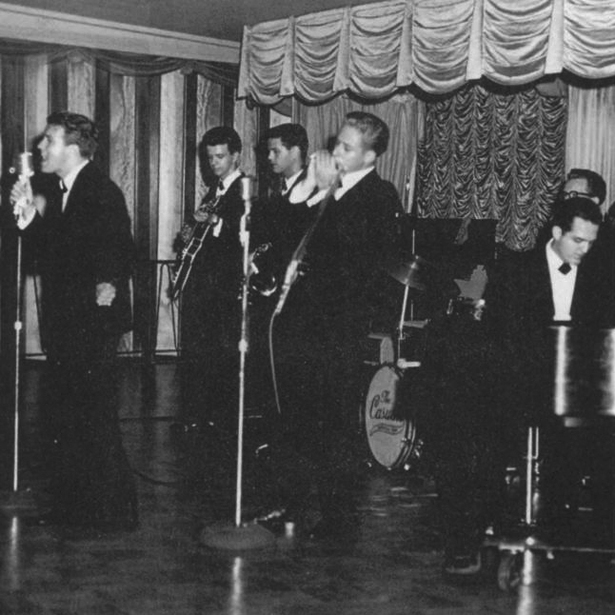
The Casuals with Tonny Moon (Harmonica)
They managed to raise money to do "Popsicle" as The Todds and "Watermelon," using the name The Countdowns, on Kenny's Image label and "She Has" by the F.J. Babies. The records featured Buzz Cason, Bobby Russell & Tony Moon on vocals and many of the instruments. The "F.J" on the "She Has" disc stood for Felton Jarvis, the personable head of the ABC record label in Nashville and the record came out on the APT label, a subsidiary of ABC. In 1963 and for two years, Buzz Cason & Bobby Russell sang under pseudonyms for Hit Records and Giant Records. Hit Records of Nashville was a 1960s budget label who recorded and released "sound-alike" recordings of hit singles by artists who often recorded under pseudonyms.

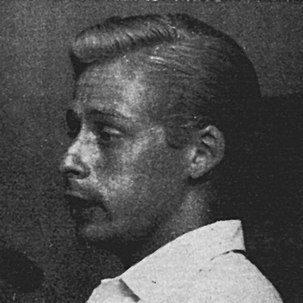
Tony Moon
These were in most cases as good as or better than the originals, and sometimes even outsold the original releases. Bobby Russell and Buzz Cason were in charge of the Pop and Rock & Roll recordings of which Bobby would go on to become one of the most successful songwriters of the 1960s with titles like "Honey" and "Little Green Apples" to his credit. Buzz Cason & Bobby Russell sang under the name of The Chellows on Many Four Seasons' Songs like "Walk Like A Man", "Big Girls Don't Cry" on Hit Records . They are the Shaw Brothers on "That's old fashioned" on Hit Records and they are the Belles on "Ain't that A Shame" b/w "If You Wanna' Be Happy" on Giant.
Songs :
(updated by Hans-Joachim)The Todds
May We Always Popsicle
Sugar Hill Tennessee
The F. J. Babies
And The Moon Came Down She Has
... your comment
your comment
-
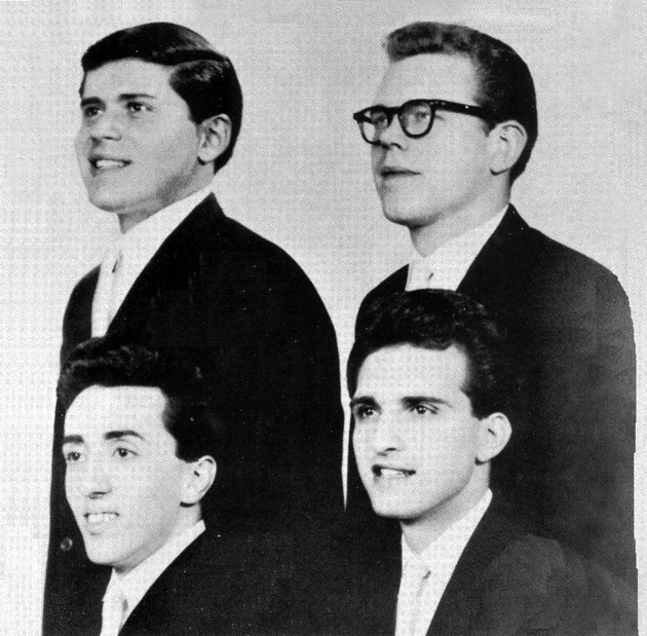
The Bob Knight Four (Brooklyn, New York)
Personnel :Bobby Bovino (Lead)
Paul Ferrigno (First Tenor)
Ralph Garone (Second Tenor)
John Ropers (Bass)
Discography :
Singles :
The Bob Knight Four
1961 - So So Long (Good Goodbye) / You Tease Me (Taurus 100)
1961 - Good Goodby / How Old Must I Be (Laurel 1020)
1961 - For Sale / You Gotta Know (Laurel 1023)
1961 - Well I'm Glad (Laurel 1025)
1962 - I'm Selling My Heart / The Lazy Piano (by The Lazy four) (Taurus 356)
1962 - Memories / Somewhere (Josie 899)
1963 - Two Friends / Crazy Love (Jubilee 5451)Eddie Delmar & The Bob Knight Four
1961 - Blanche / Love Bells (Madison 168)
1965 - Garden In The Rain / My Heart Beckons You (Vegas 628)Eps :
Acappella - Bob Knight Four (Nemo 009)
1983 - Crazy For You / Mexico / When I'm With You / Shadrack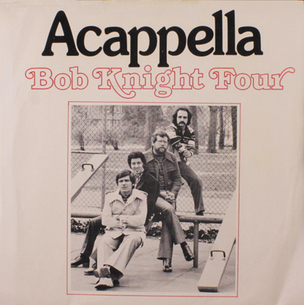
Biography :
The Bob Knight Four were one of thousands of doo wop groups whose sounds illuminated the street corners, teen clubs, and local dances of New York and dozens of other American cities from the late '50s through the mid-'60s -- a handful, such as the Belmonts, achieved national fame and even international recognition, while most never got heard outside of their own neighborhoods; the Bob Knight Four were somewhere in between, a Brooklyn-based act from Bedford-Stuyvesant, no less (when Bed-Stuy still had a significant white population), who got their work recorded and released by a major label, but never ascended higher than the lowest region of the Billboard Hot 100. The group's origins go back to an amateur outfit called the Dolphins, based at Franklin K. Lane High School in East New York, formed by Ralph Garrone, Louie Martino, and siblings John Nappier and Joe Nappier.
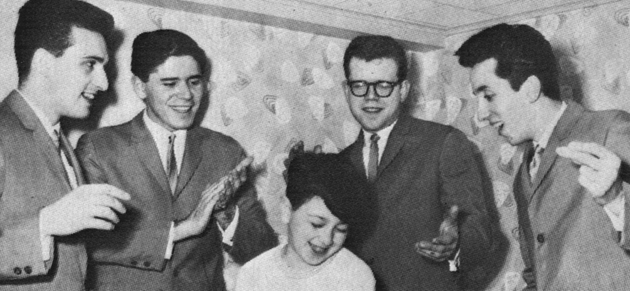
They got to record an original song of John Nappier's called "Hymn of Love," which didn't do much apart from showing its author and Ralph Garrone some potential for music, though not with that lineup. Soon they were looking for serious local talent to work with and eventually put together a group with Bob Bovino -- already a kind of local celebrity from his stint on a pre-teen talent showcase called Star Time -- on lead and Paul Ferrigno as first tenor, while Garrone took second tenor and baritone and Nappier sang bass, and a fifth member, Charlie Licata, filling the gaps between them; they also took on a new name, the Bobby Dells. They began performing regularly in their neighborhood and building a reputation, and also recording demos, going after a coveted recording deal. There was one major change along the way, with Licata getting drafted and leaving the group in 1959, leaving the Bobby Dells a quartet. With help from a local manager and a local promoter, they were introduced to Tony Sepe, the owner of Laurel Records, who was willing to record them but wanted a new name for the quartet.

Thus was spawned the Bob Knight Four, the name under which they released their debut single, "Good Good Bye," which turned into a regional hit, charting in New York (where it made the local Top Ten on some listings), Philadelphia, and parts of California. Their next two records failed to perform to expectations, in part -- in the case of the initial follow-up -- because of a split in the airplay between the A- and the B-sides. But biggest opportunities were beckoning for the group -- an old friend, Michael Eichner (later a vice president at Columbia Records), who worked for Jubilee Records, got them a recording contract with his label, and in April of 1962 their fourth single, "Memories" b/w "Somewhere," was released. Amid their activity for Jubilee over the next few months, the group suddenly found themselves competing with their older sides as Laurel started licensing their older songs, often with re-recorded backings and unrelated B-sides, to other small labels.

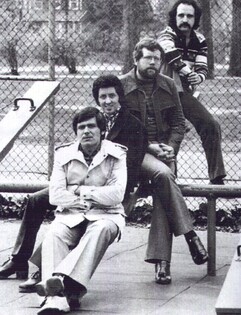
They also kept busy recording demos for various songwriters and artists associated with Jubilee, most notably the song "Cara Mia," written by Bob Nemser, which was later turned into a hit by Jay & the Americans. Nemser became the manager of the Bob Knight Four during the mid-'60s, a period in which the original group splintered amid the burgeoning British Invasion and the accompanying decline of interest in harmony vocal music. Former Bobby Dells member Charlie Licata joined Garrone and Nappier in a new version of the Bob Knight Four, with Eddie Delmar and Frank Iovino on lead. They endured into 1966, crossing paths with the Tokens at the time. They hoped to record for the latter's B. T. Puppy label, but that never worked out -- yet a version of the group survived into the early '70s, in time to cash in on the oldies revival. They even got a greatest-hits LP out, issued on the Kape label. The group was still performing on the oldies circuit in the 1990s at the time that Garrone lost his battle with cancer, and they continued performing into the middle of the decade with his younger brother filling his spot.
Bruce Eder, All Music Guide...
 1 comment
1 comment
-
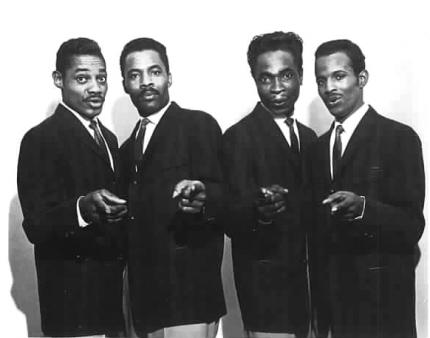
The Silhouettes (Philadelphia)
informations by Olaf Sell : http://doowopy.de/
Personnel :
Bill Horton (Lead)
Earl Beal (Baritone)
Richard "Rick" Lewis (Tenor)
Raymond Edwards (Bass)
Discography :
1957 - Get A Job / I Am Lonely (Junior 391/Ember 1029)
1958 - Headin' For The Poorhouse / Miss Thing (Ember 1032)
1958 - Bing Bong / Voodoo Eyes (Ember 1037)
1958 - I Sold My Heart To The Junkman / What Would You Do (Junior 396/Ace 552)
1959 - Evelyn / Never Will Part (Junior 400/Ace 563)
1960 - Never / Bull Frog (20th Fox 240)
1962 - Wish I Could Be There / Move On Over (To Another Land) (Grand 142)
1962 - The Push / Which Way Did She Go (Imperial 5899)
1963 - Rent Man / Your Love (Is All I Need) (Junior 993)
1967 - Climb Every Mountain / We Belong Together (Jamie 1333)
1968 - Not Me Baby / Gaucho Serenade (Goodway 101)
Biography :
Formed in 1956 in Philadelphia, Pennsylvania, USA, the Silhouettes recorded one of the classics of the doo-wop era, "Get A Job". The song was written by tenor Rick Lewis (b. 23 September 1933) while he was in the US Army, stationed in Germany.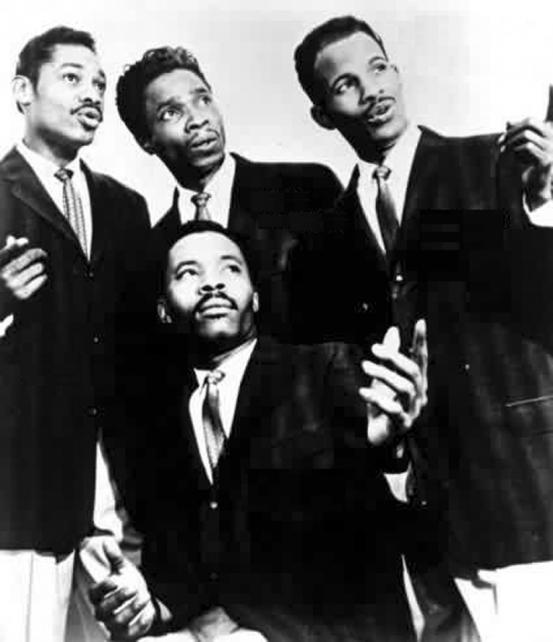
Upon returning home, Lewis joined a singing group called the Parakeets. He left them to front a band called the Gospel Tornadoes, comprising lead singer Bill Horton (b. 25 December 1929, d. 23 December 1995), bass singer Raymond Edwards (b. 22 September 1922) and baritone Earl Beal (b. 18 July 1924). When the gospel group changed to secular music, it took on a new name, the Thunderbirds. A disc jockey, Kae Williams, signed the group to his own Junior Records in 1958 and "Get A Job" was recorded as the b-side to the ballad "I Am Lonely".

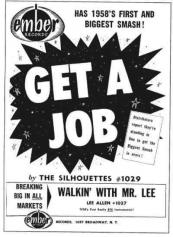
The group's name was changed to the Silhouettes (after a 1957 hit by the Rays) and the record was released on the larger Herald-Ember label. "Get A Job" received more attention than the ballad side and ultimately found its way to number 1 in the USA, becoming, in time, one of the best-known up-tempo doo-wop records. The nonsense phrase "sha-na-na-na", part of its lyric, was borrowed in the late 60s by the rock 'n' roll revival group Sha Na Na.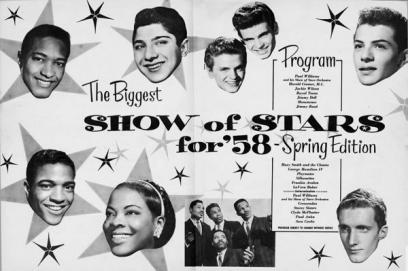
1958 the Silhouettes recorded a number of follow-ups, Bing Bong for example, but never again returned to the charts. With numerous personnel changes, the group managed to stay afloat until 1968, latterly as the New Silhouettes.

The four original members reunited in 1980 and carried on working the revival circuit until Horton's death in 1995.
http://doowopy.de/old/e-02.html
http://www.classicurbanharmony.net/Silhouettes.htm
http://www.theSilhouettes.org/
http://home.att.net/~marvart/Silhouettes/silhouettes.html
Video :
CD :
MP3 : 1 comment
1 comment
-

The Contours (Detroit, MI)
Personnel :
Billy Gordon (Lead)
Sylvestre Potts
Joe Bilingsley
Dennis Edwards
Billy Hoggs
Benny ReevesHubert Johnson (Bass)
Discography :
1961 - Whole lotta woman / Come on & be mine (Motown 1008)
1961 - Funnt / The Stretch (Motown 1012)
1962 - Do you love me / Move Mr man (Gordy 7005)
1962 - Shake Sherry / You better get in line (Gordy 7012)
1963 - Don't let her be your baby / It must be love (Gordy 7016)
1963 - You get ugly / Pa, I need a car (Gordy 7019)
1964 - Can you do it / I'll stand by you (Gordy 7029)
1964 - The day when she needed me / Can you jerk like me (Gordy 7037)
1965 - Searching for a girl / First i look at the purse (Gordy 7044)
1966 - Determination / Just a little Misunderstanding (Gordy 7052)
1967 - It's so hard being a loser / Your love grows more precious (Gordy 7059)
Biography :
The Contours are widely remembered for their 1962 smash "Do You Love Me?," one of the early hits that helped put Motown on the map.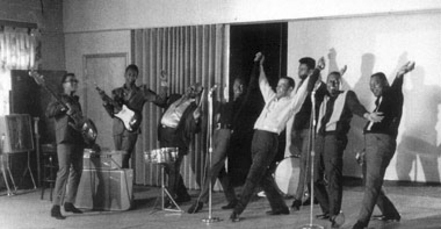
Yet they aren't always associated with their contribution to the label; they were one of the roughest, hardest R&B groups Berry Gordy ever signed, and their sound simply didn't resemble the smooth, sophisticated blueprint that later became Motown's trademark. Nor did their stage presence; in contrast to the slick choreography and wardrobe of Motown's signature artists, the Contours were all wild, irrepressible energy, leaping and sliding all over the stage and even doing the splits. As a result, they fell out of favor once Motown got its crossover-friendly hit factory up and running, and never duplicated the success of their first hit.

Formed in Detroit in 1958, the Contours originally began life as a quartet called the Blenders. Lead singer Billy Gordon, Billy Hogg, Sylvester Potts, and Joe Billingslea were soon joined by Hubert Johnson, a cousin of the legendary Jackie Wilson, as well as guitarist Huey Davis. Changing their name to the Contours, the group landed an audition with Berry Gordy's fledgling Motown label. Gordy was not impressed and told them to try again in a year, and they enlisted Jackie Wilson's aid in honing their act. Wilson personally recommended the group to Gordy, who finally relented and signed them up in 1961. The Contours' first single "Whole Lotta Woman" sank without a trace, and Gordy nearly dropped them until Wilson once again interceded on their behalf. The move paid off handsomely when Gordy offered them a chance to cut "Do You Love Me?," a song originally intended for the Temptations, who couldn't quite nail down the rough and rowdy feel Gordy wanted. Released in 1962, "Do You Love Me?" zoomed straight to the top of the R&B charts in just a few short weeks, peaking at number three on the pop side.

Although the Contours were riding high thanks to their hit and their exciting live act, they found the momentum difficult to maintain. They were able to score a follow-up hit, "Shake Sherrie," in 1963, and ran off a string of R&B Top 40 singles over 1965-1966: "Can You Jerk Like Me?," the Top Ten "The Day When She Needed Me," the Smokey Robinson-penned "First I Look at the Purse," and "Just a Little Misunderstanding." Despite the often high quality of those singles, the Contours simply weren't getting the attention -- either from the label or the public -- that Motown's top stars were, and their sound was more of an anomaly at Hitsville than ever. By this time, the original quintet was no longer intact; new members included Joe Stubbs, brother of the Four Tops' Levi Stubbs, and Dennis Edwards, who went on to replace David Ruffin in the Temptations.

The Contours had their last charting single in 1967 with "It's So Hard Being a Loser"; Billingslea and Potts subsequently led versions of the group on the oldies circuit during the '70s and '80s. Sadly, Johnson committed suicide in 1981, and wasn't around to witness the 1988 revival of "Do You Love Me?" thanks to the wildly popular film Dirty Dancing. Billingslea, Potts, and their new cohorts hit the oldies circuit with renewed vigor, and also cut the album Running in Circles for U.K. Motown revivalist Ian Levine's Motorcity label in 1990.

Stubbs passed away in 1998, and guitarist Davis did likewise in 2002.
Steve Huey, All Music Guide
Video :
CD :
MP3 :
 your comment
your comment
Doo Wop - Rhythm & Blues - Mail : jcpiazza26@gmail.com


